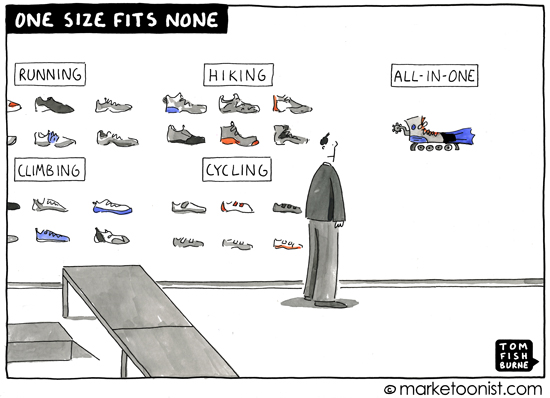One size fits none
Great post from Tom Fishburne about marketing's tendency to aggregate and average out customer feedback. He suggests a focus on 'jobs-to-be-done' a la Clay Christensen but I think it applies in so many ways.
I think the key is to understand the context in which the item will be used which can then help you to identify the different audiences or user groups your product might apply. Let's consider a simple enterprise software example such as a CRM system. You might have some people like an inside sales team that almost exclusively interacts with the system via their desktop. Conversely, your face-to-face sales team is on the road all the time and craves mobile support.
In both of the examples, the jobs-to-be-done are the same (updating CRM system) but the context in which that job is to be done is strikingly different. When both of these groups discuss what is important, they rarely will agree since their context are so different. As a result, there is fragmentation in priority and other things that are common to both audiences (but often less valuable to each) get prioritized. As Tom put it the application owner will ultimately "average out all of the feedback from consumers, ending up with one-size-fits-none products."
57 views and 3 responses
-
Jul 16 2012, 10:50 AMHutch Carpenter responded:I've been defining a structure for #jtbd (jobs-to-be-done):
- Situation
- Job
- Success meansFor me, the situation part is very important. Using the CRM system example, you'd have users with two different, but related, jobs.
INSIDE SALES
Situation: When I'm in the office...
Job: I want to update the CRM system rapidly
Success means: Reduced time to under 30 seconds to enter updatesFIELD SALES
Situation: When I'm out at client sites...
Job: I want to update the CRM system rapidly
Success means: Reduced time to under 30 seconds to enter updates -
Jul 18 2012, 8:49 AMWolf Cramer responded:Hutch.... agreed, the situation or context I think is very important.
-
Jul 23 2012, 10:16 AMRobert Schade responded:To innovate around jobs, context is critically important for the reasons you suggest. We have experience with jtbd with both tightly defined and loosely defined contexts and as one would guess, the better the definition of the context, the more actionable the results.
